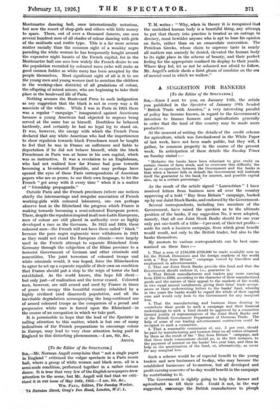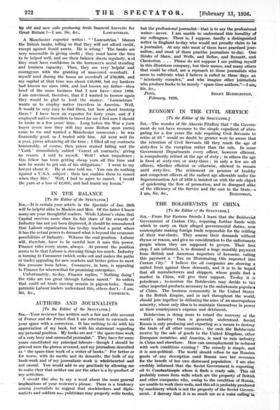A SUGGESTION FOR BANKERS
[To the Editor of the SPECTATOR.] Sia,—Since I sent to you, on January 18th, the article you published in the Spectator of January 30th headed "British Trade with America," a very interesting parallel of policy has become known, in regard to the Government's intention to finance farmers and agriculturists generally in order that the land of this country may be made more productive.
At the moment of writing the details of the credit scheme for agriculture, which was foreshadowed in the White Paper of last week, have not been made public, but they will, I gather, be common property in the course of the present week. In anticipation of these details the Sunday Times on Sunday stated :—
" Hitherto the hanks have been reluctant to give credit on certain classes of farm stock, and to overcome this difficulty the basis of co-operation between the Government and the banks is that when a farmer falls in default the Government will institute itself the guarantor to the bank for interest, and possible capital also, up to a certain percentage."
As the result of the article signed "Lancastrian" I have received letters from business men all over the country
approving of a bold "Buy from Britain" campaign, backed up by our Joint Stock Banks, and endorsed by the Government.
Several correspondents, including two members of the Government, have raised the question as to the ultimate position of the banks, if my suggestion No. 2 were adopted, namely, that all our Joint Stock Banks should for one year only put one-tenth of a tithe-1 percent. of their net profits— aside for such a business campaign, from which great benefit would result, not only to the British trader, but also to the banks themselves.
My answers to various correspondents can be best sum- marized on these lines :—
1. That a sum of L150,000—£200,000 be made available now to hit the British Dominions and the foreign markets of the world with a "Buy from Britain" campaign voiced by travellers and emphasized in advertisements.
2. That our Joint Stock Banks provide this fund and that the Government should endorse it, i.e., guarantee it.
3. That British manufacturers and traders pay sums varying from E300 to £600, according to the character of their manufactured goods and the nature of their appeal to the markets of the world, in two equal annual instalments, giving their firms' trade accept- ances or their underwriting letters to the banks' fund, whereby in two years the banks would be repaid the whole of their capital sum and would only look to the Government for any marginal loss.
4. That the manufacturing and business firms desiring to contribute their goods to such a campaign and their financial undertakings to such a fund should be approved by a committee formed jointly of representatives of the Joint Stock Banks and of the British Government Department of Overseas Trade. The help of some of our leading advertisement contractors could be co-opted to such a committee. 5. That a reasonable commission of, say, 5 per cent, should be paid by manufacturing and business firms on all orders obtained by them as the result of the "Buy from Britain" campaign, and that these trade commissions should go, in the first instance, to the payment of interest on the banks' two year loan, and then to help in the amortization of the fund, or, alternatively, as cover for any marginal loss.
Such a scheme would be of especial benefit to the young traders and new businesses of to-day, who may become the established businesses of to-morrow, but all developed and profit-earning concerns of to-day would benefit in the campaign by contributing to it.
The Government is rightly going to help the farmer and agriculturist to till their soil. Could it not, in the way suggested, encourage the British manufacturer to plough bp old and new soils producing fresh final:kid harvests for Great Britain ?—I am, Sir, &c., LANCASTRIAN.
A Manchester exporter writes : " Lancastrian ' blames the British banks, telling us that they will not afford credit, except against liquid assets. He is wrong ! The banks are very reasonable in giving credit ; they must know the firm to be helped well, and see their balance sheets regularly, and they must have confidence in the borrower's moral standing and business capacity. Then, they are very helpful and courageous with the granting of unsecured overdraft. I myself used during the boom an overdraft of 250,000, and my capital at that time was about 240,000, but my bankers had known me since 1898, and had known my father—then head of the same business that I now have—since 1866. I am convinced, therefore, that if I wanted to borrow again they would be glad to lend the money. 'Lancastrian' wants us to employ native travellers in America. Well, it would be very easy to find them, but how about trusting them ? I have been an exporter for forty years, and if I employed native travellers to travel for me I feel sure I should be broke in a few years' time. Long before the War a yarn buyer (even now they still buy some Bolton spun yarns) came to me and wanted a Manchester connexion ; he was financially good, so I traded with him. All went well for a year, prices advancing all the time ; I filled all my contracts honourably, of course, then prices started falling and the ' Yank ' immediately cabled 'Cancel all contracts,' giving no reason. I said to myself, ' Well ! what impudence ; this fellow has been getting cheap yam all this time and now he wants to get out of his obligations.' I went to my lawyer about it. He at once told me, 'You can do nothing against a U.S.A. subject ; their law enables them to cancel when they like.' Well, I had to agree to cancel. I resold the yarn at a loss of 22,000, and had learnt my lesson."



















































 Previous page
Previous page